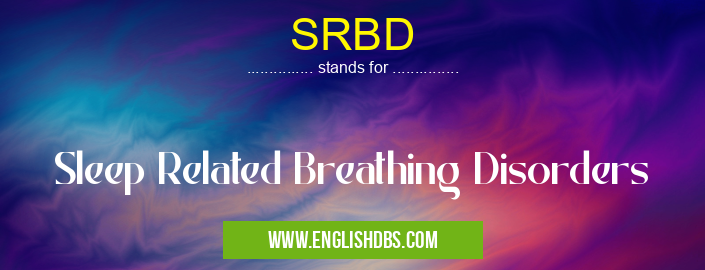What does SRBD mean in DISEASES
SRBD stands for Sleep Related Breathing Disorders, which are a group of disorders that affect a person's breathing patterns during sleep. This includes conditions such as sleep apnea, snoring, and bruxism (grinding of teeth). SRBDS can cause serious health complications that range from daytime fatigue to stroke. Treatment options vary depending on the disorder, but may include lifestyle changes, medications or surgery.

SRBD meaning in Diseases in Medical
SRBD mostly used in an acronym Diseases in Category Medical that means Sleep Related Breathing Disorders
Shorthand: SRBD,
Full Form: Sleep Related Breathing Disorders
For more information of "Sleep Related Breathing Disorders", see the section below.
What is SRBD?
SRBD is a broad term used to refer to any disorder that affects a person's ability to breathe properly while they are sleeping. These disorders can disrupt a person’s quality of sleep and lead to other health issues such as daytime fatigue and increased risk for cardiovascular disease. Types of SRBDs include sleep apnea, snoring, and bruxism (grinding of teeth).
Causes
The exact causes of SRBDs vary depending on the specific disorder. In general, these disorders are caused by physical factors such as excess weight or obesity, genetic abnormalities in the airway tissue that narrow the airway during sleep, and structural issues in the nose or throat that lead to airway obstruction. Other factors such as alcohol consumption, smoking and certain medications can also contribute to SRBD symptoms.
Symptoms
The most common symptom of an SRBD is loud snoring during sleep or pauses in breathing due to airway obstruction. Additionally, people with an SRBD may experience excessive tiredness during the day despite getting enough hours of restful sleep at night; they may also experience frequent headaches when waking up from sleeping or find it difficult to concentrate during activities such as work or school. Other symptoms may include nighttime sweating, morning dry mouth and sore throat upon waking up from sleeping.
Diagnosis & Treatment
If you think you have signs or symptoms associated with an SRBD then you should consult your doctor so he/she can perform tests and develop a customized treatment plan for you. Generally speaking treatment plans will focus on lifestyle changes as well as using therapies aimed at improving airflow through the airways during your sleep including CPAP devices or oral appliances provided by dentists trained in this field. Other treatments could include surgery depending on the severity of your condition.
Essential Questions and Answers on Sleep Related Breathing Disorders in "MEDICAL»DISEASES"
What is a Sleep-related Breathing Disorder?
Sleep-Related Breathing Disorders (SRBDs) are a group of medical conditions characterized by abnormal or disrupted breathing during sleep. SRBDs can cause disturbed sleep, excessive daytime sleepiness, reduced oxygen saturation levels, and complications such as high blood pressure, stroke, and cardiovascular disease.
Are there different types of SRBDs?
Yes. The most common forms of SRBDS include obstructive sleep apnea (OSA), central sleep apnea (CSA), and Complex Sleep Apnea Syndrome (CSAS). OSA is caused by an obstruction of the airway while CSA is caused by an interruption in the transmission of signals from the brain to the muscles that control breathing. CSAS involves both OSA and CSA occurring at the same time.
What are the symptoms of SRBDs?
The most common symptoms associated with SRBDs are loud snoring, difficulty breathing during sleep, pauses in breathing, waking up with shortness of breath or gasping for air, daytime fatigue, irritability and difficulty concentrating.
How can I tell if I have an SRBD?
If you experience any of the signs or symptoms listed above, it is important to seek medical advice right away as this could be indicative of a more serious disorder like Obstructive Sleep Apnea (OSA) or Central Sleep Apnea (CSA). A formal diagnosis can only be made through a comprehensive evaluation involving a physical examination and specific laboratory tests.
How do doctors treat SRBDS?
Treatment for SRBDs will depend on which type of disorder you have been diagnosed with but may include lifestyle modifications such as weight loss or avoiding certain medications; continuous positive airway pressure therapy (CPAP); oral appliance therapy; surgery; and/or behavioral therapies such as cognitive behavioral therapy for insomnia (CBT-I) or stimulus control therapy.
Are there any long-term risks associated with untreated SRBDS?
Yes. Untreated SRBDS can increase your risk for developing hypertension, cardiovascular disease, stroke, metabolic syndrome and depression among other health problems due to lack of quality sleep over time.
Does having an undiagnosed SRBDS put me at risk?
Yes. Being undiagnosed increases your risk for developing serious medical conditions such as stroke and heart attack because these conditions develop slowly over time without proper treatment or management. It is important to seek early evaluation for possible signs and symptoms that may indicate an underlying condition that needs medical attention.
Can children also be affected by SRBDS?
Yes. Children who snore loudly at night may be more likely to suffer from an underlying condition like Obstructive Sleep Apnea Syndrome (OSAS) which affects up to five percent of all children in some countries. OSAS can cause learning difficulties due to lack of quality sleep as well as bedwetting issues so it is important to talk to your doctor about any concerns you may have regarding your child's sleeping pattern.
